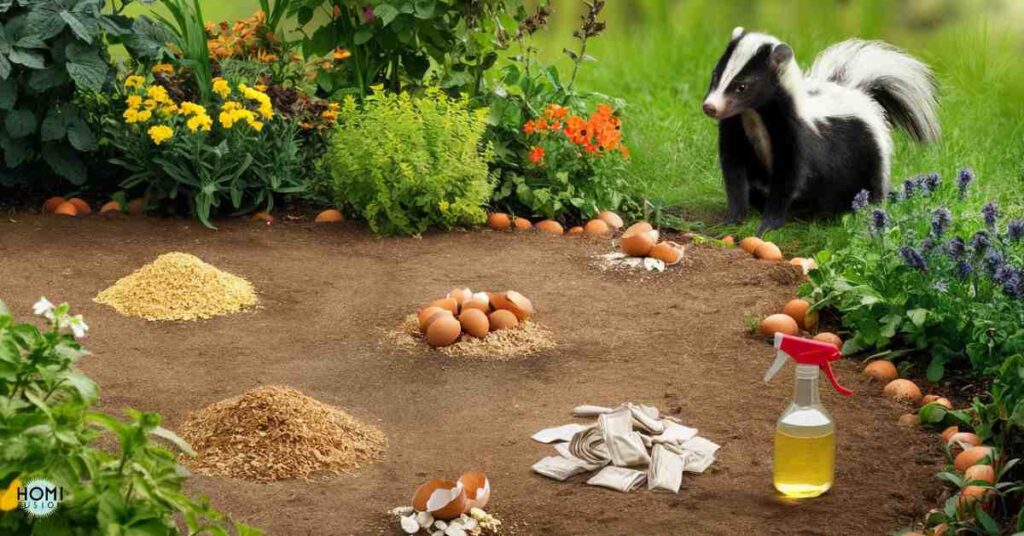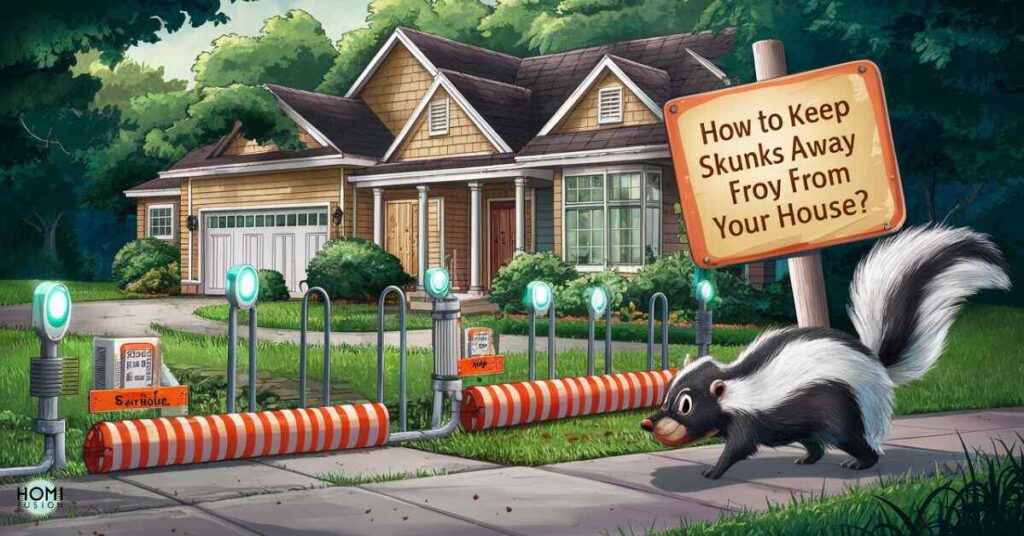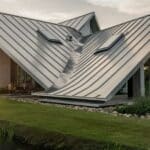Encountering a skunk near your home can be an unpleasant and potentially smelly experience. These small, striped mammals are known for their potent defensive spray, which can linger for an uncomfortably long time.
They often take up residence under porches, decks, sheds or any other structure that provides cover and protection. Additionally, skunks are drawn to areas where they can easily forage for food, such as garbage cans, pet food bowls, or lawns rich in grubs, earthworms and other insects.
While skunks play an essential role in controlling insect and rodent populations, their presence too close to your property can be a nuisance. Fortunately, there are effective strategies you can implement to deter these unwanted visitors and keep your home skunk-free.
Understanding Skunk Behavior and Habits
Skunks are often found near homes because they seek safe, cozy places to establish their subterranean burrows. These burrows provide shelter and protection for skunks, and they prefer to dig them underneath existing structures like porches, decks, or sheds, as these areas offer natural overhead cover. If you notice a skunk frequenting your property, it’s likely that it has taken up residence nearby, probably beneath one of these structures.
In addition to suitable denning sites, skunks are enticed by the availability of food sources. They are opportunistic foragers, meaning they’ll eat just about anything they can find. Skunks are particularly fond of grubs, which they dig up from lawns, as well as other insects like termites, beetles, grasshoppers, crickets, and roaches. They also enjoy feasting on small mammals such as mice and rats, as well as pet food left out for dogs and cats.
Skunks are nocturnal creatures, meaning they are most active at night when they venture out to forage for food. During the day, they typically hunker down in their burrows, conserving energy.
While skunks don’t truly hibernate, they may enter a state of torpor during the coldest months of winter. In this state of reduced activity and metabolic rate, they can survive on their fat reserves for extended periods without leaving their burrows.
However, skunks are most active during the spring and fall seasons when the temperatures are mild and food sources are abundant. It’s during these periods that you’re most likely to encounter a skunk near your home as they search for suitable denning sites and food.
To avoid getting sprayed by a skunk, it’s crucial to give them ample space and never corner or threaten them. Contrary to popular belief, it’s relatively difficult to provoke a skunk into spraying. They typically only resort to this defensive mechanism when they feel genuinely threatened or startled. If you encounter a skunk, back away slowly and avoid making sudden movements or loud noises that could startle it.
Exclusion Techniques to Restrict Skunk Access
One of the most effective ways to keep skunks away from your home is to restrict their access to potential denning sites. Skunks frequently dig burrows under porches, decks, stairs, sheds and mobile home entrances, as these areas provide the overhead cover they seek for their shelter. To prevent skunks from making themselves at home in these spaces, you can use chicken wire or wire mesh fencing to block their access.

When installing the fencing, be sure to dig it several inches into the ground to prevent skunks from simply digging underneath it. If they cannot find sturdy overhead cover to dig beneath, they are far less likely to establish their burrows near your home.
In addition to restricting access to potential denning sites, it’s also important to declutter your yard. Keep vegetation trimmed back from your home’s perimeter. Skunks feel more comfortable approaching properties with clutter, such as brush, shrubs, fallen branches, and other debris, as these provide cover for their approach. By keeping your lawn clear and open, you make it less appealing for skunks to move towards your home. They will feel exposed and vulnerable in such environments.
Maintaining a clear perimeter around your home is another effective deterrent. Skunks often navigate around properties by sneaking through bushes and shrubbery. Keeping any ornamental plants near your home neatly trimmed back can help discourage their presence. Aim to maintain a gap of at least two inches between your home’s exterior and any vegetation to eliminate potential pathways for skunks.
Limiting Food Sources for Skunks
As opportunistic foragers, skunks are drawn to areas where food is readily available. One of their favorite food sources is grubs, which feed on the roots of your lawn. Skunks will dig into your turf or even roll it away to get at these grubs, causing significant damage to your lawn in the process.
To prevent grubs from attracting skunks, it’s essential to practice diligent lawn maintenance. Keeping your lawn healthy and strong will help discourage grub infestations. This reduces the likelihood of skunks digging up your yard in search of these tasty morsels. You can also use pesticides or nematodes specifically designed to eliminate grubs and discourage their return.
In addition to grubs, skunks will eat just about any food source they can find. Be sure to remove potential food sources from your yard, such as:
- Fallen fruits
- Bird seed
- Pet food left outdoors
- Seeds, nuts, and berries
- Leaves and twigs
By eliminating these readily available food sources, you’ll make your property less attractive to skunks and other pests.
Read this blog:
How To Get The Smell Of Skunk Out Of Your House
Natural Repellents and Deterrents
While there are various natural repellents and deterrents touted as effective skunk deterrents, their success rates tend to be mixed. Some examples include:

- Ammonia-soaked rags or mothballs placed near skunk denning areas: The harsh smells of these substances may deter skunks, at least temporarily, but they will need to be reapplied as the odors fade.
- Citrus oils, castor oil or predator urine: These have had limited success in deterring skunks, and their effectiveness can be inconsistent.
- Cayenne pepper or other hot pepper solutions: While these may deter skunks, they can also pose a risk to children and pets that come into contact with them.
It’s important to exercise caution when using any natural repellents. Some may be harmful or pose risks to non-target species, such as your pets or children.
Another deterrent strategy involves using bright yard lights and loud noises around your property. However, these methods have proven more effective at annoying neighbors than deterring wildlife. They can also attract insects, which are a primary food source for skunks.
Professional Skunk Removal Services
If a skunk has already taken up residence on your property, attempting to remove it yourself can be risky and ineffective. Not only do you run the risk of getting sprayed, but improper removal techniques can also be inhumane. They may even be illegal in some areas.

For safe and effective skunk removal, it’s best to enlist the help of professional wildlife control services. These experts have the knowledge, experience, and specialized equipment to safely and humanely capture skunks from your property. They can also relocate them without causing harm to the animals or putting themselves at risk.
Professional skunk removal services also have the necessary permits and licenses. They can legally handle and transport skunks, ensuring compliance with any relevant wildlife regulations in your area.
Preventing Future Skunk Infestations
Implementing the strategies outlined above can effectively deter skunks and encourage them to move on from your property. Being proactive and consistent with your deterrence efforts is crucial to preventing future skunk infestations.
Regular inspections of your property should be conducted to identify and address any potential denning sites that may have developed. Pay close attention to areas under porches, decks, sheds, and any other structures. These could provide overhead cover for skunks to establish their burrows.
If you notice any signs of skunk activity, such as cone-shaped holes in your yard or the unmistakable odor of skunk spray, it’s important to take prompt action. This can help prevent further issues and address the problem effectively. Addressing the issue early can prevent skunks from becoming fully established and making it more difficult to deter them.
Maintaining a consistent routine of securing potential food sources is a good idea. This includes keeping garbage cans tightly sealed, removing pet food bowls at night, and practicing diligent lawn maintenance to control grub populations.
If, despite your best efforts, skunk problems persist on your property, don’t hesitate to seek professional assistance. Wildlife control experts have the knowledge and tools to effectively and humanely resolve skunk infestations. They ensure a safe and skunk-free environment for you and your family.
Also Read:
How To Get Rid Of Brown House Moths?
Case Study: A Skunk-Free Backyard
Jane and her family had been dealing with a skunk problem in their backyard for several months. Despite their attempts to deter the skunks using ammonia-soaked rags and bright lights, the skunks kept returning. They were digging up their lawn in search of grubs and leaving behind an unpleasant odor.
Frustrated, Jane decided to seek professional help. She contacted a local wildlife control company, who sent a technician to assess the situation. The technician identified a skunk den under Jane’s back porch and recommended a comprehensive skunk removal and exclusion plan:
- Technician humanely trapped and relocated skunks from the den.
- Sealed off den entrance using wire mesh to prevent new skunks from entering.
- Provided guidance on lawn maintenance to control grub populations and deter future skunk activity.
- Jane and family now enjoy backyard without skunks, highlighting importance of professional assistance and comprehensive deterrence approach.
Quote:
“An ounce of prevention is worth a pound of cure.”
Benjamin Franklin
This quote perfectly encapsulates the importance of being proactive in deterring skunks from your property.
Frequently asked questions
What scent will keep skunks away?
Citrus, ammonia, or peppermint scents can help keep skunks away.
What are skunks afraid?
Skunks are afraid of loud noises, sudden movements, and predators like dogs.
Will lights keep skunks away?
Bright lights may deter skunks temporarily but are not a foolproof method.
What kills the smell of a skunk?
A mixture of hydrogen peroxide, baking soda, and dish soap can help neutralize skunk odor.
Do skunks hate vinegar?
Skunks dislike strong vinegar smells, which can be used as a repellent.
How to make homemade skunk repellent?
Homemade skunk repellents often include ingredients like hot peppers, garlic, or citrus oils.
What spice keeps skunks away?
Spices like cayenne pepper or black pepper can deter skunks from areas where they’re applied.
Conclusion
Keeping skunks away from your house requires a multi-faceted approach that combines an understanding of skunk behavior and habits with effective deterrence strategies. By restricting access to potential denning sites, eliminating food sources, and using safe repellents and deterrents, you can significantly reduce the likelihood of skunks taking up residence near your home.
Remember, being proactive and consistent with your skunk deterrence efforts is key. Regular property inspections, diligent lawn maintenance and prompt action at the first signs of skunk activity. It can go a long way in preventing future infestations.
If you find yourself facing a persistent skunk problem, don’t hesitate to seek professional assistance from wildlife control experts. Their knowledge, experience, and humane removal techniques can effectively resolve skunk issues and restore peace of mind to your property. By following the strategies outlined in this article, you can take proactive steps to keep your home skunk-free, ensuring a safe and odor-free environment for you and your family to enjoy.







